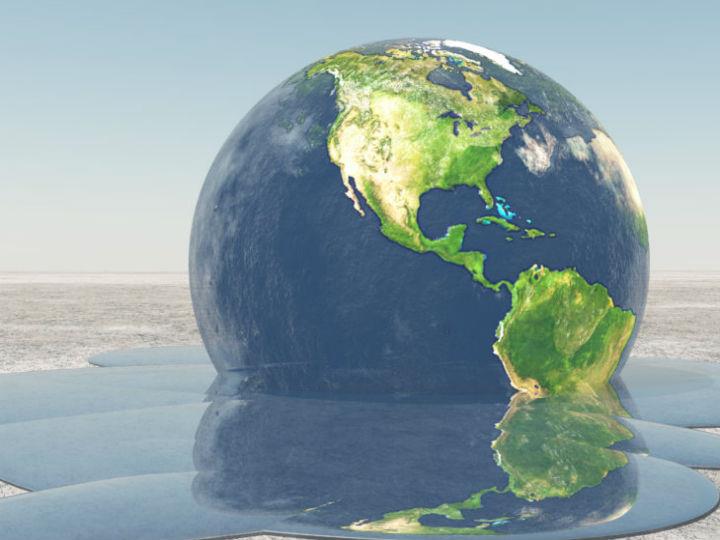by Helen Regan*
The group of researchers, who published a commentary in the journal Nature, say there is growing evidence to suggest that irreversible changes to the Earth’s environmental systems are already taking place, and that we are now in a "state of planetary emergency."
A global tipping point is a threshold when the planet’s systems go beyond the point of no return -- such as the loss of the Amazon rainforest, accelerated melting of ice sheets, and thawing of permafrost -- the authors of the commentary say.
Such a collapse could lead to "hothouse" conditions that would make some areas on Earth uninhabitable.
"We argue that the intervention time left to prevent tipping could already have shrunk towards zero, whereas the reaction time to achieve net zero emissions is 30 years at best," the authors said.
Active problem areas
Led by Timothy Lenton, professor of climate change and Earth system science at the University of Exeter, in southwest England, the team identified nine areas where they say tipping points are already underway.
Those include widespread destruction of the Amazon, reduction of Arctic sea ice, large-scale coral reef die-offs, melting of the Greenland and West Antarctic ice sheets, thawing of permafrost, destabilizing of boreal forests -- which contain vast numbers of trees that grow in freezing northern climes -- and a slowdown of ocean circulation.
The team claims that these events are interconnected and change in one will impact another, causing a worsening "cascade" of crises.
For example, the Arctic is warming at least twice as quickly as the global average. Melting Arctic sea ice is driving warming further because less heat is reflected off the planet.
That regional warming is leading to an increased thawing of Arctic permafrost, soil that stays frozen throughout the year, which is releasing carbon dioxide and methane into the atmosphere. The warming has triggered large-scale insect disturbances and fires in North American boreal forests "potentially turning some regions from a carbon sink to a carbon source," the team said.
The researchers said early results from preliminary models suggest the climate is much more sensitive than first thought and that a global tipping point is possible.
"Research last year analyzed 30 types of regime shift spanning physical climate and ecological systems, from collapse of the West Antarctic ice sheet to a switch from rainforest to savanna," they added. "This indicated that exceeding tipping points in one system can increase the risk of crossing them in others."
Emissions, global warming
The idea of a climate tipping point is not new. The UN Intergovernmental Panel on Climate Change (IPCC) introduced the concept 20 years ago.
Back then, the UN suggested such "large-scale discontinuities" would only come about when global warming exceeded 5 degrees Celsius above pre-industrial levels.
But the authors say data from the two most recent IPCC reports in 2018 and September 2019, suggest tipping points can happen between 1 C and 2 C of warming.
Global average temperatures are today around 1 C higher than in the pre-industrial age and continue to rise.
One report from 2018 -- of which Lenton was part of -- suggested that a domino effect will kick in if global temperatures rise more than 2 degrees Celsius above pre-industrial levels.
The model highlighted the consequences of how the interactions between a variety of climate change factors, such as the loss or weakening of carbon sinks, forest dieback, ice retreat and increased bacteria respiration, could combine to form a feedback loop which accelerates climate change.
The authors acknowledge that there are limits to their understanding of climate tipping, and further investigation is needed. But they say the possible impact could be so huge and "irreversible" that "to err on the side of danger is not a responsible option."
In other words, not acting is "too risky to bet against" in their view.
And time is of the essence.
While the 2015 Paris Agreement set a goal to limit the Earth’s warming to 1.5 degrees Celsius, a UN report this month said that pledges countries made to limit the climate crisis are nowhere near enough to stave off record-high temperatures.
The UN Environment Program (UNEP) 2019 Emissions Gap report said at the current rate, temperatures are expected to rise 3.2 C by 2100.
Greenhouse gases reached a record high in 2018 with no sign of peaking, according to a recent World Meteorological Organization report. Carbon dioxide levels reached 407.8 parts per million, a unit used to measure the level of a contaminant in the air.
Hope is not lost, however. Researchers say that mitigating greenhouse gas emissions could still slow down the accumulation of these climate impacts.
What is needed, they say, is urgent international action to cut emissions, slow sea level rise, and to keep warming to 1.5 C.
"A saving grace is that the rate at which damage accumulates from tipping -- and hence the risk posed -- could still be under our control to some extent," they said.
"The stability and resilience of our planet is in peril. International action -- not just words -- must reflect this."
*writer for the Asia-Pacific region with a particular focus on human rights
**first published in: cnn.com




 By: N. Peter Kramer
By: N. Peter Kramer
